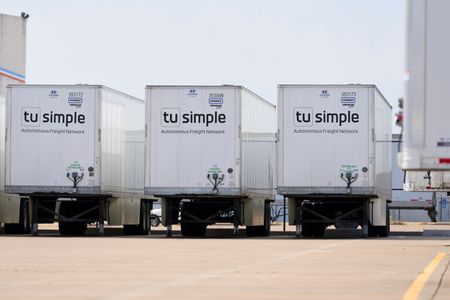(Reuters) – Self-driving truck startup TuSimple Holdings Inc is being investigated by the FBI, U.S. Securities and Exchange Commission (SEC) and Committee on Foreign Investment about its relationship with China-backed Hydron Inc, the Wall Street Journal reported on Sunday.
The officials are looking at whether TuSimple and its executives, specially Chief Executive Xiaodi Hou, breached fiduciary duties and securities laws by failing to properly disclose the relationship with Hydron, the WSJ said, citing people familiar with the matter.
They are also trying to find out whether TuSimple shared intellectual property developed in the United States with Hydron and whether that action defrauded TuSimple investors by sending valuable technology to an overseas adversary, the newspaper said.
Launched by TuSimple Co-Founder Mo Chen in June, Hydron is committed to developing, manufacturing, and selling hydrogen-powered trucks equipped with L4 autonomous driving technology, according to its website.
TuSimple’s board opened its own investigation in July, looking into whether the company incubated Hydron in China, including by funding and transferring technology to the startup without informing regulators, the TuSimple board or its shareholders, WSJ said, citing other people familiar with the matter.
A TuSimple spokesman told WSJ that the company isn’t aware of any FBI or SEC investigations and that Hou has never been a Hydron employee or received payment from Hydron. Hou also does not have a financial interest in the company.
TuSimple revealed in its IPO prospectus last year that its backer Chinese social media firm Sina Corp’s investments in TuSimple had been put under review by the Committee on Foreign Investment in the United States (CFIUS).
TuSimple and the SEC did not respond to a Reuters request for comment on the report.
(Reporting by Juby Babu in Bengaluru; Editing by Sandra Maler)

